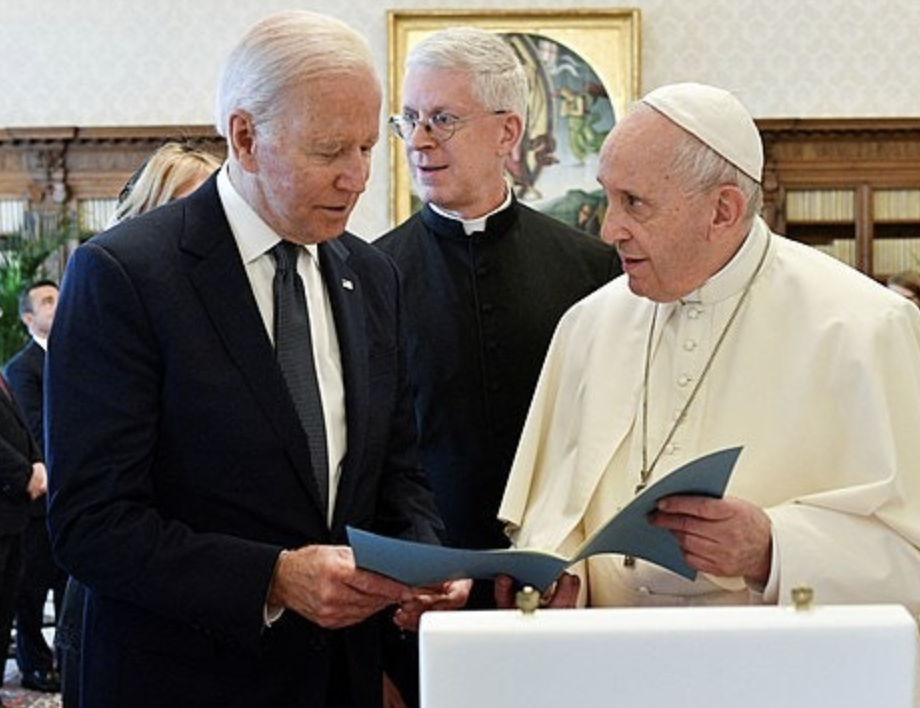It was the telephone call heard around the world, because the pope made the call.
On the other end of the line was a single woman in central Italy, who mailed Pope Francis a confused, anguished letter after learning she was pregnant by a man who turned out to be married. The man demanded that she have an abortion and she refused.
Then a strange telephone number appeared on her caller ID screen. It was the pope, who called to say that she made the right decision because the "child was a gift from God" and that he wanted to help.
Pope Francis, she told The Catholic Herald, assured her that "as Christians we should never be afraid. He told me I had been very brave and strong for my unborn child. I told him that I wanted to baptize the baby when it was born, but I was afraid, as I was divorced and a single mother. ... He said he would be my spiritual father and he would baptize my baby."
If the baby is a boy, she plans to name him Francis.
A few news organizations, but not many, covered this media-friendly parable.
But two weeks later, the pope unleashed a media tsunami with a long, candid interview published exclusively in America and other Jesuit magazines around the world. While the pope talked about confession, sin and mercy, one quote leapt into news reports and headlines more than any other.
"We cannot insist only on issues related to abortion, gay marriage and the use of contraceptive methods. This is not possible," he told the interviewer, a fellow Jesuit. "The teaching of the church ... is clear and I am a son of the church, but it is not necessary to talk about these issues all the time."
Stressing the need for improved pastoral responses on hot-button issues -- such as abortion and homosexuality -- Pope Francis said the church "cannot be obsessed with the transmission of a disjointed multitude of doctrines to be imposed insistently. .... We have to find a new balance; otherwise even the moral edifice of the church is likely to fall like a house of cards, losing the freshness and fragrance of the Gospel."
The pope, of course, stressed the need for balance between pronouncements and pastoral care, not the end of the church's public advocacy on its moral doctrines. He said that Catholic leaders cannot insist "only" on issues linked to sexual ethics, which is not the same as saying they should be silent on them.
The church, he said, must be a "field hospital" for the wounded and its most important message is "the first proclamation: Jesus Christ has saved you. And the ministers of the church must be ministers of mercy above all."
The world of Catholic bloggers, insiders and experts exploded, both on the doctrinal left and the right. Some traditional Catholics expressed sadness and concern, focusing on secular media editing of the pope's remarks, more than on the content of the actual interview.
While the media storm raged, Pope Francis did an interesting thing -- especially in light of his alleged call for the church to tone down its teachings on abortion and other hot-button issues. He addressed, with little media fanfare, a gathering of Catholic gynecologists, urging them to remember that a doctor's "ultimate objective" must always be the protection of life.
"The culture of waste, which now enslaves the hearts and minds of many, has a very high cost: it requires the elimination of human beings, especially if they are physically or socially weaker," he said, according to a English translation offered by The National Catholic Register.
"Our response to this mentality is a categorical and unhesitant 'yes' to life. ... Things have a price and are sold, but people have a dignity, worth more than things and they don't have a price. Many times we find ourselves in situations where we see that which costs less is life. Because of this, attention to human life in its totality has become a real priority of the Magisterium of the Church in recent years, particularly to the most
defenseless, that is, the disabled, the sick, the unborn child, the child, the elderly who are life's most defenseless."
In the end, stressed the pope, the church must continue to proclaim that, "Each child who is unborn, but is unjustly condemned to be aborted, bears the face of Jesus Christ, bears the face of the Lord, who, even before he was born, and then as soon as he was born, experienced the rejection of the world."







